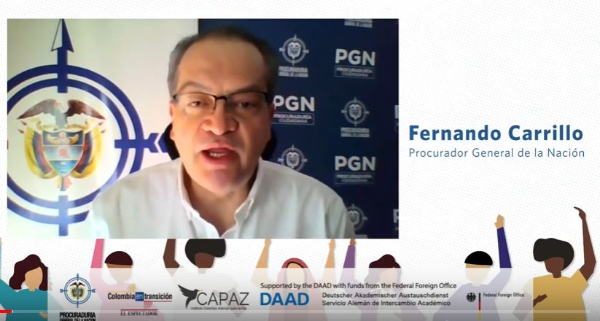
“Victim participation must be the legacy of future generations”: Attorney General of the Nation
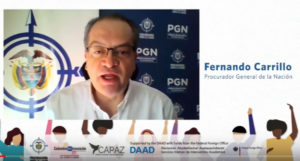
Fernando Carrillo. Screenshot of the video
Victim participation in the transitional justice was one of the central themes of the interventions in the online meeting of June 30, 2020, jointly organised by CAPAZ and the Attorney General’s Office, in alliance with the El Espectador Colombia2020 project.
Access the video recording of the event
Attorney General, Fernando Carrillo was emphatic in his opening remarks: transitional justice must ensure that victims are heard and able to participate in order to safeguard their rights. “The standard is the defence of victims; that is the way what we need to work towards”, said the Attorney General. The other central theme of the event was the fight against impunity. The Attorney General also referred to this issue, as would be expected given the nature of the institution he directs. He stressed the need to “stop this machine of impunity that has been operating in Colombia”.
Two additional ideas from the Attorney General’s speech warranted attention. Transitional justice cannot be the scene of political or electoral disputes: inherited differences and hatreds must be overcome. Nor should it be postponed on account of COVID-19. “Justice for peace cannot be another pandemic casualty”, he pointed out. If victims should be heard in a normal situation, they should be heard all the more so during the pandemic.

Fabián Salvioli. Screenshot from the video
Fabián Salvioli: A rapporteur who supports the country and is a voice that privileges the victims
One of the protagonists of the academic encounter was undoubtedly Fabián Salvioli. The United Nations Special Rapporteur for transitional contexts (truth, justice, reparation, and guarantees of non-repetition), assumed his functions in 2018, but has not yet visited Colombia. “The State has not yet agreed to allow me to visit the country”, he affirmed.
You may also like: ‘The State has not yet approved my visit to Colombia’: UN Special Rapporteur (Colombia2020 El Espectador)
Fabian Salvioli praised Colombia as the “most important transitional justice laboratory in the world”. However, he was emphatic about victim participation: in the transitional system everything has to be complied with, and without real victim participation, it will fail. Not a superficial participation, not just to meet international obligations or State policies. “They must participate, because if the victims do not participate seriously, from the beginning to the end, the process simply fails and history will repeat itself”.
For the rapporteur, impunity is a serious problem, against which Colombia has made enormous efforts. While he considers reconciliation an important aspect, he believes that it cannot imply impunity. The State must guarantee the rights and compliance with the pillars of transitional justice: truth, justice, reparation, guarantees of non-repetition and memory. “To fail to comply with any of them is to fail to comply with democracy”, he said. Fabián Salvioli assured that he closely follows the mandates of the Special Jurisdiction for Peace – JEP and the Truth Commission, and reiterated his commitment to the victims of the Colombian armed conflict. “The pain of the victims is today’s; it is not a pain from the past”.
CAPAZ, academia, and the international community
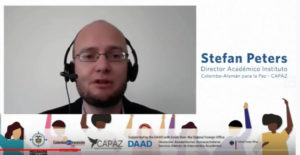
Stefan Peters. Screenshot from the video
CAPAZ Academic Director, Stefan Peters also spoke at the opening of the meeting. He echoed the ideas of Carrillo and Salvioli and added that the international and academic communities are not only interested in the peace process. In particular, the academic community also sees great aspirations in the transitional justice system in Colombia. While “there are no perfect systems”, Peters argued, the Comprehensive System of Truth, Justice, Reparation and Non-Repetition has a very positive design.
The CAPAZ director said that post World War II Germany did not want to face the past. Interests that seek to undermine or boycott the peace accords, the clarification of the truth, or that justice be done “should not surprise us”, he said. “I think it’s part of a democracy. But it is important to stress that there are obligations. And that there is no alternative to peace either. If we want a more prosperous country, with more social cohesion, to strengthen democracy, we have no alternative to peace”. CAPAZ will continue to promote and hold meetings like the one described here, to encourage this type of reflection and exercise.
Panel
Mónica Cifuentes is the Delegate Attorney to the JEP and was in charge of moderating the panel that followed the opening, comprising Clara Sandoval, researcher at the University of Essex; Kai Ambos, Director of CEDPAL, attached to the University of Göttingen; and Sergio Jaramillo, former High Commissioner for Peace in Colombia.
Principle of centrality and guarantees of victims’ participation
Clara Sandoval initially referred to the two sides of the victims’ centrality. On the one hand, from a normative and conceptual perspective, it is a recurrent and transversal theme (the rights of the victims are at the centre of the work of the Comprehensive System). On the other hand, from a practical point of view, it is an immense challenge. “It means that we have to establish victims’ participation as a practical mechanism in transitional processes”. Otherwise, the process fails, the researcher agreed with the UN special rapporteur.
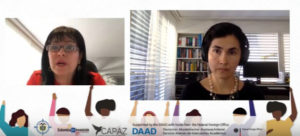
Procuradora Cifuentes (on the left) and Clara Sandoval. Video’s screenshot
One such mechanism is the Victims’ Participation Handbook designed by the JEP. The handbook is currently in the process of being socialized, but subject to delays in its adoption. Although it is not a norm or a guarantee of results, there must be very clear commitments for the manual to permeate the operation of the jurisdiction and its processes, guaranteeing minimum standards in its functioning.
Another aspect related to the quality of victims’ participation is comprehensiveness. Sandoval said that, beyond rhetoric, there is a need to make comprehensive victim participation a reality, from the beginning to the end of the processes, and to work comprehensively among the components of the transitional justice system in Colombia. “That dialogical idea of restorative justice is central”, Sandoval said. Finally, she referred to the challenges posed to the JEP by the COVID-19 pandemic. Technology is an opportunity and it challenges knowledge in terms of its use or the enabling of technological access to online hearings, with security guarantees as a right of the victims.
Transparency with the victims
CEDPAL Director (University of Göttingen) and renowned jurist, Kai Ambos, began his speech on two topics: selection and prioritisation. He referred to transitional article 66 of the Constitution, which distinguishes both concepts and assigns responsibility to different bodies. An outside observer can see that there is a lot of material on prioritisation, but not as much on the issue of selection. “From my procedural logic, what we do as prosecutors is that we choose cases according to criteria, according to each system, but we all choose. Once we choose, then we might think about prioritising cases”. For Professor Ambos, the relationship between these concepts is not very clear in Colombian law and practice.
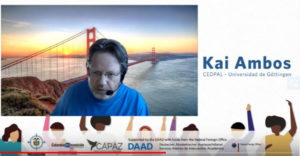
Kai Ambos. Video’s screenshot
What do these concepts have to do with impunity? A lot, according to Professor Ambos. Because impunity is something normal in criminal justice systems, and this occurs via selection processes, since prosecutors do not manage to cover all cases. This is inherent. “There are so many victims, so many perpetrators, that there is no other way than to choose. What has to be established is transparency”.
All systems have a selection process, because they all have issues of capacity. Here, we face the problem of the duty of States to prosecute and punish these crimes. This is related to our perception of “doing justice”. Satisfying the victims is a great pretence, according to Professor Ambos. In his experience in the processes he has accompanied, even in his own country, Germany, it is very difficult to satisfy the victims. The problem is that “we are creating expectations that are too high”, he said. It is a tension we live with and a very big challenge, because the processes are made by and for the victims and, apart from that, they involve communication with them.
The most difficult thing for the victims and the public is that they feel that these decisions are not transparent. Kai Ambos recommended giving more thought to JEP criteria and policies and to the institutions in general, as this is a problem that also exists in the ordinary justice system. “We need a more transparent policy that clarifies the criteria by which it is decided whether or not to pursue a case. For example, if I have seven macro-cases, why those seven in particular?” he reflected. “The pedagogical work is very important”, emphasised Ambos. “To make the victims understand that there are limits to justice”.
The application of sanctions
Former High Commissioner for Peace Sergio Jaramillo addressed the issue of sanctions inherent in the transitional system and the challenge of their implementation. How are these sanctions conceived in the Final Agreement? What are the levels of coordination required for their implementation? What are the levels of state articulation that must be applied to achieve their purpose? Former Commissioner Jaramillo addressed the issue from three perspectives: from the 2016 Final Agreement; from implementation; and from verification.
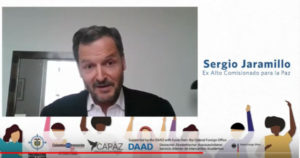
Sergio Jaramillo. Screenshot from the video
The Final Agreement provides for “satisfying the rights of the victims and consolidating peace”. In this sense, the former Commissioner appealed to not put “a name to justice”, and to follow what is clearly stated in the agreement. He stressed the importance of responding adequately to all the rights of the victims, in line with the statements made by Salvioli.
The question is how to do this in practice, as it is a complex task, given that the sanction itself targets several rights at once. Sergio Jaramillo highlighted the approach of the agreement, which is based on the territorial approach and the idea of implementing these sanctions in relation to a specific place. “We have to rationalize how this is going to be done on the ground and see what programme we have today”, he said. As an example, he mentioned supporting demining work that provides communities with concrete results.
Conclusions
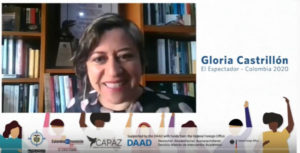
Gloria Castrillón. Screenshot from the video
The editorial director of El Espectador’s Colombia2020, Gloria Castrillón hosted the event. Her conclusions highlighted the following aspects:
- Without the participation of the victims there is no possible justice.
- According to figures shared by researcher Clara Sandoval, Colombia has a precedent in the Justice and Peace Process with the paramilitaries: 64% of the versions and testimonies were the result of victims’ participation.
- The JEP’s victims’ participation manual should not only be completed, but put into effect.
- It is not a question of victim participation, but of ensuring the quality of this participation.
- The components of the system need to be integrated.
- Impunity is normal in criminal proceedings, but at the same time, entities in the system must be clear and transparent with the victims regarding the limitations of the system.
- Sergio Jaramillo stressed that the government of President Iván Duque should implement the PDETs. Although there are challenges in doing so due to the coronavirus pandemic, the idea is that they continue to be implemented and that they serve as a tool for bringing their own sanctions to the territories.
Access the video recording of the event: “The struggle against impunity and victim participation in transition contexts”, available on the CAPAZ YouTube channel.
(Text: Claudia Maya. Review: Juliette Vargas, Carlos Nupia, Kai Ambos and Stefan Peters. English version: Tiziana Laudato)



